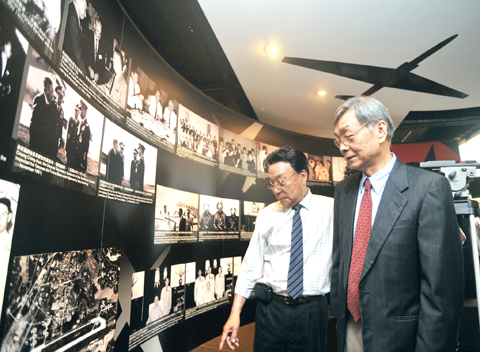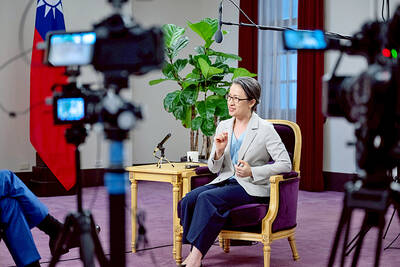For weeks after narrowly escaping two Chinese missiles, Chuang Jen-liang (莊人亮) would wake up at night bathed in sweat, but the spy pilot could talk to no one about his missions.
Only now, more than four decades later, is 73-year-old Chuang able to speak out about his harrowing experiences, as Taiwan is lifting the veil on one of its most closely guarded secrets of the Cold War.
This brings credit to Chuang and other veterans of the 35th “Black Cats” Squadron who flew at altitudes of more than 20,000m to gather intelligence about the Chinese, risking their lives each time.

PHOTO: PATRICK LIN/ AFP
“I doubt if I’d be so lucky if I had to go through all this again,” said Chuang, who now lives in an apartment in Hsinchu City.
The elite Black Cats, who were operational from 1961 until 1974, flew the legendary U-2 airplane, dubbed “Dragon Lady” and a crucial intelligence tool at the time.
That made the squadron a key element in the intelligence relationship between the US government and the Chinese Nationalist Party (KMT) government.
“The information they gathered was crucial for understanding the Chinese communists’ military deployment, especially since spy satellites weren’t available,” Air Force Lieutenant General Wang Mu-jung (王木榮) said.
However the information came at a steep cost. At the height of the Cold War, flying the U-2 was one of the most dangerous jobs any military man could perform.
Of the 28-member Black Cat squadron, four were shot down and killed over China, while two were taken prisoner and kept incarcerated for nearly 20 years.
Six lost their lives during training missions.
One of the Black Cats’ key areas of interest during the 1960s was China’s speedily evolving nuclear program, a source of great concern after Beijing detonated its first atomic bomb in October 1964.
Fears that China was now developing a hydrogen bomb formed the backdrop to Chuang’s most complicated and daring mission, codenamed “Tabasco,” on May 7, 1967, over a test site at Lop Nor in northwestern China.
Since the area was too far away from Taiwan, Chuang took off from a US base in northern Thailand, and once over the target zone he dropped a pair of 2m-long sensors onto the desert floor.
Six weeks later, the two sensors transmitted signals to Taipei confirming that China had tested its first hydrogen bomb.
In all their missions, the Black Cats were flying at altitudes too high for China’s Soviet-designed MiG planes, but instead they faced the lethal menace of its surface-to-air missiles.
Chiu Sung-chou (邱松州), a former Black Cat, remembered steering frantically to evade missiles fired against him in the skies over Dalian in 1973, with split-second decisions making the difference between life and death.
“If I had turned my plane either a little bit earlier or later after the missile alert went on inside my cockpit, I would have been hit,” he said.
Chiu’s sortie over Dalian was one of the last carried out by a Black Cat over China. The year after, the US terminated the program in the spirit of new detente with Beijing.
With tensions across the Taiwan Strait greatly reduced, and documents about the US-Taiwan cooperation in intelligence declassified, the public can finally learn more about the Black Cats.
Two schools in Taiwan are named after pilots who died in the line of duty, and the Ministry of National Defense is scheduled to hold a special exhibition in October to honor the pilots.
This is in recognition of their contribution not only in the field of military intelligence, but also to relations with the US.
“No doubt, the secretive missions of the Black Cat Squadron have helped promote military ties with Washington,” said Taiwanese aviation historian Clarence Fu (傅鏡平) said, who has coauthored a book on the subject. “The United States was rather reliant on Taiwan when it comes to spying on [China].”

China might accelerate its strategic actions toward Taiwan, the South China Sea and across the first island chain, after the US officially entered a military conflict with Iran, as Beijing would perceive Washington as incapable of fighting a two-front war, a military expert said yesterday. The US’ ongoing conflict with Iran is not merely an act of retaliation or a “delaying tactic,” but a strategic military campaign aimed at dismantling Tehran’s nuclear capabilities and reshaping the regional order in the Middle East, said National Defense University distinguished adjunct lecturer Holmes Liao (廖宏祥), former McDonnell Douglas Aerospace representative in Taiwan. If

TO BE APPEALED: The environment ministry said coal reduction goals had to be reached within two months, which was against the principle of legitimate expectation The Taipei High Administrative Court on Thursday ruled in favor of the Taichung Environmental Protection Bureau in its administrative litigation against the Ministry of Environment for the rescission of a NT$18 million fine (US$609,570) imposed by the bureau on the Taichung Power Plant in 2019 for alleged excess coal power generation. The bureau in November 2019 revised what it said was a “slip of the pen” in the text of the operating permit granted to the plant — which is run by Taiwan Power Co (Taipower) — in October 2017. The permit originally read: “reduce coal use by 40 percent from Jan.

‘SPEY’ REACTION: Beijing said its Eastern Theater Command ‘organized troops to monitor and guard the entire process’ of a Taiwan Strait transit China sent 74 warplanes toward Taiwan between late Thursday and early yesterday, 61 of which crossed the median line in the Taiwan Strait. It was not clear why so many planes were scrambled, said the Ministry of National Defense, which tabulated the flights. The aircraft were sent in two separate tranches, the ministry said. The Ministry of Foreign Affairs on Thursday “confirmed and welcomed” a transit by the British Royal Navy’s HMS Spey, a River-class offshore patrol vessel, through the Taiwan Strait a day earlier. The ship’s transit “once again [reaffirmed the Strait’s] status as international waters,” the foreign ministry said. “Such transits by

Taiwan is doing everything it can to prevent a military conflict with China, including building up asymmetric defense capabilities and fortifying public resilience, Vice President Hsiao Bi-khim (蕭美琴) said in a recent interview. “Everything we are doing is to prevent a conflict from happening, whether it is 2027 or before that or beyond that,” Hsiao told American podcaster Shawn Ryan of the Shawn Ryan Show. She was referring to a timeline cited by several US military and intelligence officials, who said Chinese President Xi Jinping (習近平) had instructed the Chinese People’s Liberation Army to be ready to take military action against Taiwan